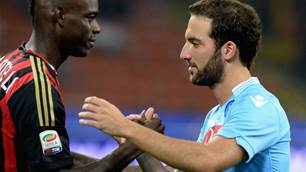Working 24/7, forever on the phone, globetrotting across the atlas and often pushing footballing laws to the absolute limit, a quiet man with a notebook is to thank for many of your team’s players.
"When times are tight scouting is one of the first things to get cut back," says Derek Bragg of The Scouting Network. "That's been great for our business as more and more clubs can't afford a full-time scouting network, particularly in the lower and non-leagues. Also, club chairmen are increasingly reluctant to spend their money on players so they are using our service as a second or third opinion and to get a greater due diligence on any potential new signings."
Scouting networks vary in strength from country to country. Spanish clubs have an obvious advantage and emotional pull in much of South America. Lyon have uncovered world-class Brazilians like Fred, Ederson and Juninho, but overall French clubs lack a commercial presence and history of sporting achievement. Germany's proximity to eastern Europe gives them an advantage in that region, but when it comes to manpower and financial muscle, Premier League clubs rule the roost. "Everywhere I go I see English scouts," says Miroslav Vjatrovic, who has covered the Balkans for Liverpool. "English clubs have so many scouts and the money to attract the best. That's a huge advantage."
Contacts and continuity are everything in the world of scouting and Arsenal have fast mastered the rules of globalisation. Wenger's long-time friend Jean-Michel Guillou has an academy in Ivory Coast which has produced the likes of Kolo Toure and Emmanuel Eboue. Guillou has since established commercial partnerships with other clubs in Africa, Asia and Europe to keep Arsenal ahead of the game. They also send their coaches all over the world to work and expand their network of contacts. In short, no stone is left unturned.
"A couple of years ago a team from Bangladesh came to play some matches in England," says Philippe Auclair. "They were low-profile fixtures for the benefit of the local Bangladeshi community, but for some reason I went along. I was very impressed with the team's goalkeeper and I mentioned him to Arsene. I couldn't believe it when Arsene said he already knew of the player. He was from Bangladesh, for heaven's sake! I'm convinced there isn't a player on the planet that Arsenal don't know about."
Manchester United are fast catching up with Arsenal. They've made real progress in Brazil with the acquisitions of the Da Silva twins, Fabio and Rafael, and Rodrigo Possebon. They've recently signed a deal with Traffic, a TV rights company who own Sao Paulo-based youth club Deportivo Brasil, which has 120 teenagers. United will have first option on their players plus 90 others that Traffic own the economic rights to. The deal is within FIFA's rules but when it comes to scouting young players the rules are often being stretched and loopholes exploited.
United's Italian-based scout David Williams has been lauded by Sir Alex Ferguson for securing the signatures of Lazio teenager Federico Macheda and Roma striker Davide Petrucci. But in Rome, United's movements have caused consternation. "We tried ¬everything to stop Manchester United from taking our player but the present Italian regulations don't give you any type of defence," complained Lazio president Claudio Lotito. "We find ourselves in a proper cattle market." Italian clubs are prevented from tying a player under 18 to a contract. Petrucci was signed by United after his 16th birthday on a contract worth £95,000 ($155,000) a year (the maximum permitted for a youth team player) while his father was offered a job as groundsman at the club's training ground. In 2009, Chelsea were banned from signing players for a year after FIFA found their signing of Gael Kakuta from French club Lens breached the club's contract with the 18-year-old.
The ban was overturned after Chelsea agreed an out-of-court settlement but the signs are that FIFA are beginning to clamp down on clubs' recruitment techniques. Money talks and talent walks, and it's not just teens being bought. One scout, who asked to remain anonymous, told FFT he knew an eight-year-old being paid £1,000 ($1,600) a month to play for a Premier League club. The amount is big enough to secure the loyalty of the player and their parents but small enough to be put through the club's books as 'miscellaneous expenses'.
Much of a scout's work is shrouded in secrecy. FFT requested interviews with scouts at several Premier League clubs, but many declined. "It's like a secret society sometimes," says Reeves. "You can turn up to some games and recognise other scouts, but they can be very elusive. I suppose that's part of the job: to keep your cards close to your chest."
As scouting becomes increasingly global and sophisticated, keeping track of players has never been more technological. "We do an awful lot of work on the IT side of things," says Daniel Philpott, Everton's scout for 14- to 18-year-olds. "We have a full-time recruitment analyst who operates the computer system. It means we can keep up to date with all the players we're looking at. It's the only way to operate these days because it's so competitive. We can sign players from other clubs at the age of 16 but we need to be tracking them well before that."
Tactical scouts, who produce reports on clubs' upcoming opponents, are also becoming increasingly reliant on technology with reports often compiled on DVDs and even iPods. During the World Cup, FIFA provided a 'tactical feed' for every game. The whole match was filmed by an aerial 'spider-cam' with a perfect view of all 22 players' movements over the 90 minutes.
But for all the technology available, the art of scouting has changed very little over the years. "It's all about having an eye for a player," says Reeves. "I used to play professional football, but I don't think that really comes into it. It's something you can't teach or take qualifications for. You need to make your mind up about a player quickly because if you wait too long you could lose out. It's all about instinct."
Good scouts can save clubs millions of pounds and the further down the ladder you go, the harder scouting becomes. Oldham Athletic have a patch that allows them to recruit young players from Leeds to Llandudno but that doesn't make courting players any easier. "Every kid in this region wants to play for Manchester United, City or Liverpool," explains Latics chief scout Ron Millward, who has 18 scouts working for him. "We just try and convince the players and their parents that the jump to our first team is much smaller than at Manchester United. It's not easy but on average in the last 25 years we've discovered and developed four players for the first team every season. It's saved us thousands of pounds."
As the final whistle blows on an afternoon of matches on Merseyside, Waldron's Everton training top is still drawing stares from parents and players. Is this their moment? Will they be getting a call? "There's not a lot that's up to our standard here," says Waldron. But he's far from downbeat. There's another tournament in another town tomorrow. "The satisfaction you get from spotting a player as a kid, then seeing him making his first team debut is great. I spotted Jack Rodwell and Jose Baxter when they were only six years old. That makes it all worthwhile." And so the search continues.
Related Articles

Del Piero on that Liverpool offer

Inside the mind of El Shaarawy













